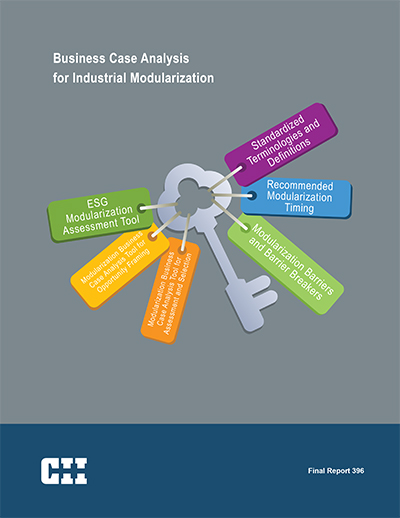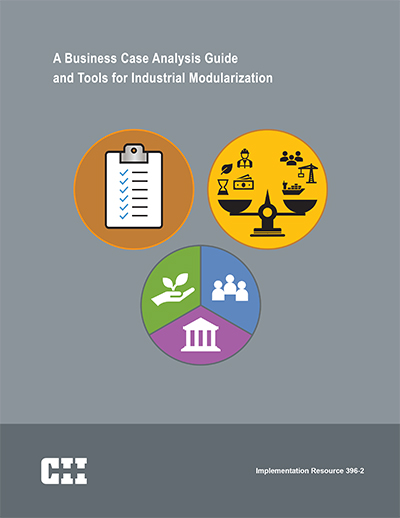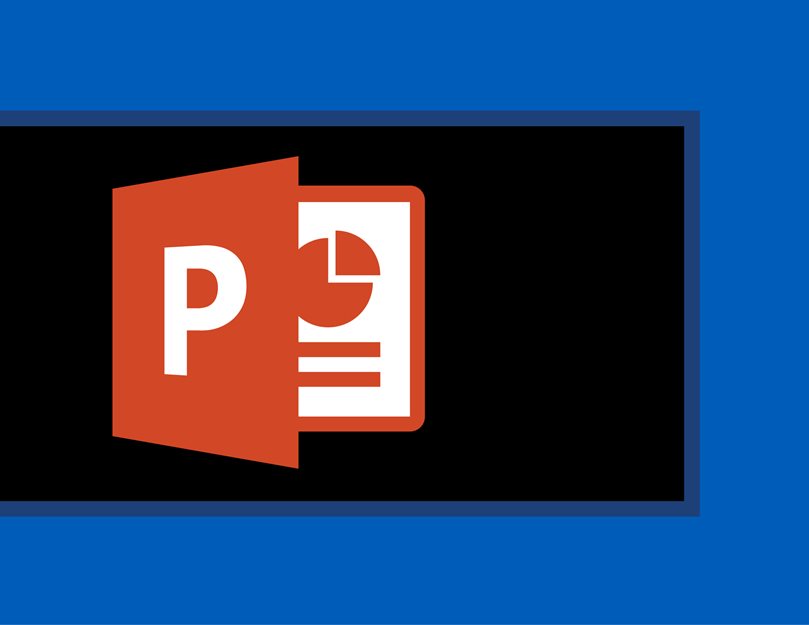
Business Case Analysis for Industrial Modularization
CII challenged RT-396 to address the essential research question: “When is the appropriate time for modularization planning, and how should a company develop a business case to support the modularization decision?”
In response to this question, the team provided the following solutions:
- Standardized modular terminologies and definitions – RT-396 defined or updated the terms currently used in the industry (i.e., modularization, site construction, offsite construction, prefabrication, preassembly, module assembly). In addition, to improve industry understanding of offsite construction concepts, the team categorized module types by their size and in terms of how they are fabricated, shipped, moved to a site, and set.
- Modularization barriers and barrier breakers – The team identified the top 10 barriers for the implementation of modularization in capital projects and how best to overcome these barriers.
- Recommended modularization timing – RT-396 recommended timing points for considering modularization during early activities and at key decisions to increase the chance of successful modular execution and to realize the full benefits of modularization.
- The Modularization Business Case Analysis Tool for Opportunity Framing – The team designed this tool to help users make informed decisions by reviewing key modularization drivers and considerations during early project phases. This tool also helps users understand the enablers and barriers related to modularization and addresses new drivers like ESG.
- The Modularization Business Case Analysis Tool for Assessment and Selection – This powerful tool identifies the optimal extent of modularization for projects during the later phase of Project Assessment and Selection. This tool provides a comprehensive analysis of costs and savings linked to varying percentages of modularization to help users identify the optimal level that will result in a successful project completion.
- The ESG Modularization Assessment Tool – This ESG (environmental, social, and governance) tool helps users determine an appropriate modularization strategy that aligns with ESG principles and practices during the Project Assessment and Selection phase. This tool generates impact scores by assessing the potential impact of the modularization strategy on each of many ESG factors identified by the team.
RT-396 gathered, defined, and updated the modularization acronyms and terminologies currently used in the industry. Among these many terms, RT-396 defined modularization as an execution strategy that transfers work from the project site to an offsite location to improve project performance (FR-396, in press).
RT-396 recommended timing points for the early activities and key decisions of modularization, when a company can increase its chances of successfully executing modularization and realizing the full benefits. If the business case drives modularization during later project phases (e.g., after FEED has been completed based on stick-built execution), the company will be required to take actions to catch up with modularization activities and key decisions that ideally would have been made during earlier phases (FR-396, in press).
RT-396 developed the Modularization Business Case Analysis Tool 1 (BCA Tool 1) to help practitioners make an appropriate decision by reviewing high-level key modularization drivers and considerations during early project phases (between Opportunity framing and Assessment). The tool also helps users better understand key modularization-related issues and overcome or mitigate these barriers during early project phases (FR-396, in press).
The Modularization Business Case Analysis Tool 2 helps users determine the optimal percentage of modularization during the later phase of Project Assessment and Selection. The tool analyzes the costs and savings associated with different percentages of modularization, allowing its users to find the optimal level of modularization to complete a project in a way that minimizes cost and maximizes benefits (FR-396, in press).
The Environmental, Social, and Governance (ESG) Modularization Assessment tool aims to guide users in finding an appropriate modularization strategy that can mitigate or benefit issues related to the ESG during the project assessment and selection phase by determining the potential impact of the modularization strategy to each ESG factor. This ESG and modularization assessment tool is targeted to be used between the Assessment and Selection phases (FR-396, in press).
The Modularization Barrier Survey identified 10 top barriers (FR-396, in press):
- Requirements of early scope and design freeze
- Vendor data unavailable to support modular execution
- No compelling business case
- Modularization not part of the project design
- Project delivery method prevents effective modularization planning and execution
- Owner’s reluctance to use modularization
- Lack of major financial and business drivers to modularize
- Lack of (early) involvement of fabricators and suppliers
- Custom projects defy standardization or repletion
- Lack of knowledge, guide, or process to execute modular projects successfully
RT-396 responded by identifying these Modularization Barrier Breakers (FR-396, in press):
- Projects need to plan, execute, and design for modularization early and properly.
- The industry needs “easy” guides and tools.
- The industry should shift its paradigm from stick-built to modular, making modularization standard
- The industry has to educate its leaders along with students and academics.


